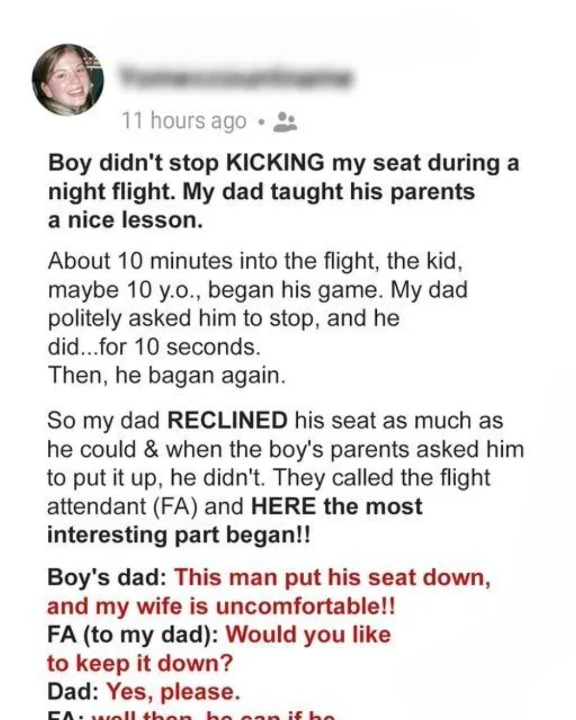It was supposed to be an easy flight home — a few quiet hours in the air, maybe a movie, maybe a nap. The engines hummed, the cabin lights dimmed, and for a while, everything felt peacefully suspended between clouds.
Then came the thump.
Once. Twice. Three times.
At first, I ignored it. Kids get restless on planes, I told myself. But within minutes, the gentle tapping turned into full-on kicks — steady, deliberate, impossible to tune out. Each jolt rattled my seat — and my patience.
I turned slightly, expecting to see a frazzled parent trying to soothe a toddler. Instead, there was a boy — maybe eight or nine — swinging his legs in perfect rhythm, eyes glued to his tablet. His parents sat on either side, both lost in their screens, oblivious.
I shifted, hoping the hint would register. It didn’t. I sighed, turned again, gave that universal polite-but-pointed look that says please stop. Still nothing.
That’s when my dad — calm, unshakable, endlessly patient — lowered his book.
My father is the kind of man who can sit through anything without complaint: traffic jams, rude cashiers, endless delays. But I recognized the moment his patience reached its edge. He set his book down, turned in his seat, and said in his even, measured voice, “Excuse me, could you please ask your son to stop kicking the seat?”
The boy’s mother didn’t even look up properly. “Oh, sorry,” she said flatly. “He’s just restless.” The father added, “He’ll calm down.” For a few blissful minutes, the kicking stopped.
Then it started again. Harder this time.
Thud. Thud. Thud.
I tensed. My dad didn’t. He just inhaled slowly — a quiet signal I’ve learned to recognize: the calm before one of his perfectly controlled storms.
Without a word, he pressed his recline button and leaned his seat all the way back. The backrest eased into the lap of the boy’s mother. She gasped. Her phone wobbled.
“Excuse me!” she snapped. “You can’t just do that!”
My dad turned his head slightly, voice calm as ever. “I can,” he said. “The seat reclines.”
The woman blinked, stunned, then flagged down a flight attendant like she’d just witnessed an assault. The attendant — an older woman with the weary calm of someone who’s seen it all — listened patiently, then said with the faintest smile, “Ma’am, passengers are allowed to recline their seats.”
That was the end of it.
The mother huffed but said no more. The attendant walked away. My dad calmly picked up his book, flipped back to the same page, and resumed reading. No smirk. No satisfaction. Just quiet resolution.
And then — silence. The boy stopped kicking. His parents sat still. For the first time in an hour, peace returned.
When I looked at my dad, he wasn’t gloating. There was just a faint, thoughtful smile — not of triumph, but of understanding. He hadn’t embarrassed anyone. He’d simply mirrored their behavior back at them until they recognized it.
When the plane began to descend, he closed his book and said softly, “You know, sometimes people only understand respect when they feel what disrespect feels like.”
There was no pride in his tone — just truth. My dad doesn’t preach. He teaches by example. Whether it’s a rude driver, a snappy clerk, or a restless kid on a plane, his rule is always the same: stay calm, stay kind, and let the lesson speak for itself.
Watching him, I realized his patience isn’t weakness — it’s strategy. He believes anger feeds chaos, but composure starves it. Real strength doesn’t shout; it simply stands firm until the noise wears itself out.
When we landed, the boy’s family hurried off the plane without a word. My dad gathered his things, adjusted his glasses, and said quietly, “Courtesy only works when people see themselves in others.”
That line stuck with me. You can’t force empathy — but sometimes, you can help someone feel it. Not through anger, but through reflection.
That flight wasn’t about revenge or pride; it was about balance. My dad hadn’t “won.” He’d just restored a little fairness to the cabin — and taught me a lesson I’ve never forgotten.
Now, whenever I fly, I still think of that moment. The loud talkers, the seat recliners, the impatient sighs — and my dad, calm in the middle of it all. His lesson echoes every time: don’t meet rudeness with noise — meet it with grace.
Because sometimes, the strongest answer isn’t confrontation. It’s quiet demonstration.
At 30,000 feet, my dad didn’t just handle an annoying kid — he modeled how to handle life: with patience, dignity, and just enough humor to protect your peace.
